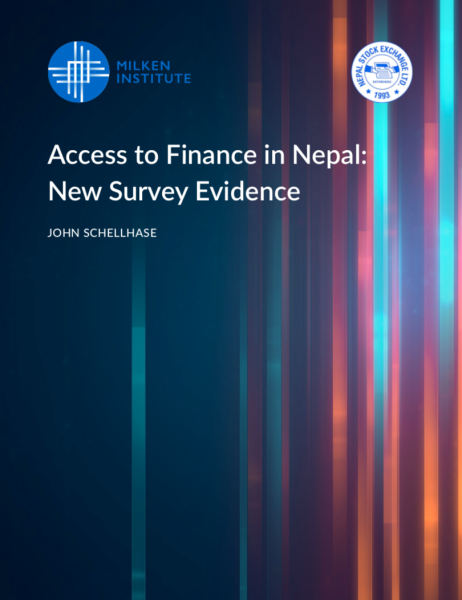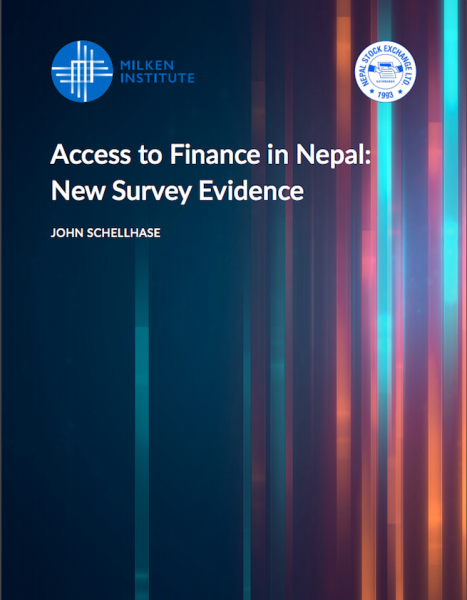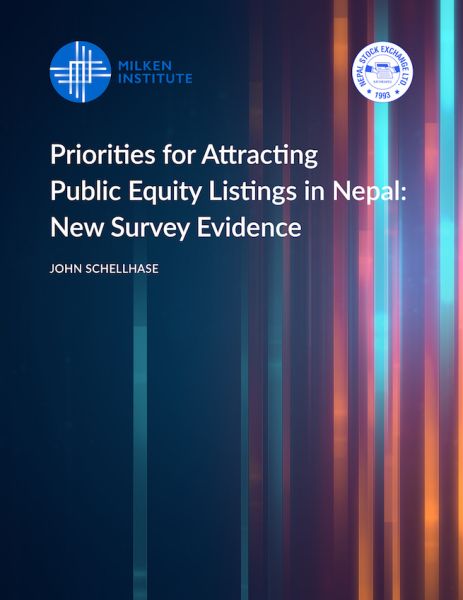
New Survey Evidence from Nepali Businesses
To explore the major priorities for—and obstacles to—developing the public equity market in Nepal, the Nepal Stock Exchange (NEPSE) partnered with the Milken Institute to organize a strategic planning roundtable in Kathmandu on May 31, 2019, during a meeting of the executive committee of the South Asian Federation of Exchanges (SAFE). The day-long event convened government officials, NEPSE management and board members, banking executives, stockbrokers and investors, international development partners, and SAFE members.
To inform the roundtable discussion, NEPSE and the Milken Institute conducted a survey earlier that month of Nepali businesses. Its purpose was to provide timely data on the current business environment and to better understand firms’ concerns about access to finance and risk exposure and their thoughts on developing the stock market.
The Milken Institute produced two reports to highlight the findings from the survey of Nepali businesses:
"Access to Finance in Nepal: New Survey Evidence"
In this report, we present the results of the survey pertaining to the business environment, access to finance, and demand for new financial tools and funding sources. Seven key findings emerged from the results:
1. Companies rank access to finance as their top obstacle.
2. Concerns about political instability and access to electricity have nearly vanished.
3. Access to finance as a business obstacle does not appear to mean an inability to access bank lending.
4. Bank loans and other current funding sources are generally insufficient for growth.
5. A large majority of firms are exposed to interest rate fluctuations.
6. Most firms would use derivatives if these products were available.
7. Demand is also strong for new corporate financing sources, particularly foreign direct investment.
"Priorities for Attracting Public Equity Listings in Nepal: New Survey Evidence"
To understand how the NEPSE might best attract new listings from other priority sectors, including manufacturing, tourism, agribusiness, health, and IT services, the survey asked unlisted firms about their perceptions of the benefits and downsides of going public and asked listed companies about their experience on the NEPSE. Below are the key findings for each group.
For Unlisted Companies:
1. Most unlisted forms had never considered issuing shares; many said they were too small.
2. The listing mandate for banks and financial institutions affected whether firms from other sectors viewed a public listing as appropriate for their company.
3. For firms that have considered listing, a top motivation is a potential impact on brand visibility.
4. Top deterrents included losing company control and the regulatory cap on IPO pricing.
5. Unlisted firms reported low awareness about the benefits and costs of listing, and very few have received educational outreach about going public.
6. And yet, most unlisted firms said they wanted to learn more about a NEPSE listing.
For Listed Companies:
1. Listed firms decided to issue shares to improve brand visibility and achieve other benefits, beyond merely complying with regulatory requirements.
2. The NEPSE has generally delivered on key benefits.
3. Firms cited a costly pre-listing process and underpricing of IPO shares as drawbacks to going public.
4. But firms did not suffer a loss of company control or other potential downsides.



